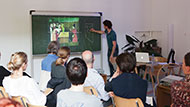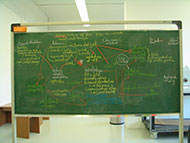a critical, alternative, and transversal pedagogy
Conceived as a learning community the Programme is founded on a pedagogy that is critical, alternative, participatory, and evolutionary, and that encourages the sharing of resources and competences as well as collaborative dynamics.
Knowing that today the challenge is global and interdisciplinary, students are encouraged to consider their research in a historical perspective, by putting it to the test of reality and addressing a critical point of view. They learn to describe it verbally and in writing with insight and intuition, and to experiment with the feasibility of their research.
Numerous examples of alternative education are to be found in the history of pedagogy in Switzerland, Germany and Italy. Toepffer, Wyneken, von Humboldt have experienced these forms in the 19th century, as well as Piaget, Walser, Montessori in the 20th century.
In the US and South America, educators such as Dewey, Freire, Giroux, Hooks, McLaren, often engaged in public life, developed a form of pedagogy associating classical and popular knowledge with civil everyday life.
Critical pedagogy affiliates to the critical theory of the Frankfurt School and the Cultural Studies of the Birmingham Scool (CCCS), whose influence is evident in the emancipatory works of numerous critical educators such as Paulo Freire, Henry Giroux and Stuart Hall. It focuses on the development of critical consciousness, which enables learners to recognize connections between their individual problems and experiences and the social contexts in which they are embedded.
Critical pedagogy is described by Henry Giroux as an “educational movement, guided by passion and principle, to help students develop consciousness of freedom, recognize authoritarian tendencies, and connect knowledge to power and the ability to take constructive action.”
Such demanding and precise educational programs aim at building other contexts and tools for the art practices.
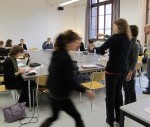

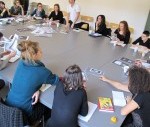
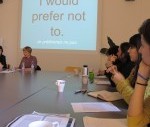
a feminist pedagogy
the challenge of digital media
Feminist pedagogy challenges the teacher-student relationship and the student’s relationship to knowledge and emphasizes participatory learning, supported by the development of critical thinking and open-mindedness, while validating personal experience and supporting the development of political/social understanding. Feminist pedagogy creates a supportive atmosphere where students respect everyone’s right to comment and critically evaluate their world and increase confidence and empowerment.
Feminist studies widely contributes to transform the basis of educational relations, emphasizing the pragmatic dimension in associating knowledge and know-how. They develop collaboration and responsibility and aim to learn to respect each other’s differences and integrate the skills of critical thinking with respect for and ability to work with others. Critical thinking, then, is not an abstracted analysis but a reflective process firmly grounded in the experiences of the everyday.
Though feminist pedagogy and critical theory share similar criteria and goals for educating students, feminist pedagogies insist upon a continual examination of the way gender affects lived experience, policy, and cultural norms, particularly by exploring and unpacking the unexamined dynamics of gender, transgender and power.
Digital media challenge current pedagogy. How do we learn with digital media to become more proficient, think in more complex ways, gain better judgment, become more curious, and lead productive lives? Today, learning is at least as much about access to other people as it is about access to information. Participatory learning cannot be exclusively about “career readiness” or vocational training but must also assist learners to reflect on social contexts, history and ethics.
Today, learning to learn through digital media implies that it simply is not enough to have access to Wikipedia or YouTube or syllabi from famous institutes; the urgent question becomes how we meaningfully and effectively learn with these tools, repositories, platforms and all open educational materials. How do we ignite student engagement, political and creative imagination, their intellectual quest and lifelong thirst for knowledge?


